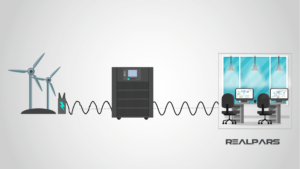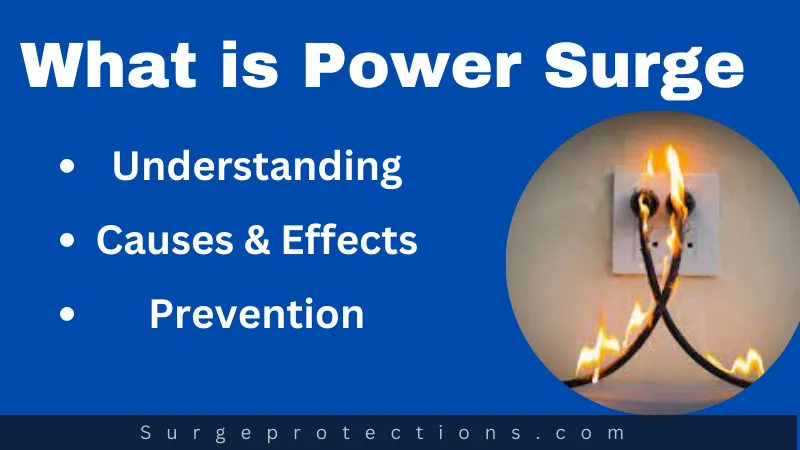Definition:
A power surge is a sudden and temporary increase in the electrical voltage that flows through a power outlet or circuit and can be detected by its general symptoms. It typically lasts for a fraction of a second, but it can cause damage to electronic devices that are connected to the affected circuit. Power surges can be caused by lightning strikes, power outages, short circuits, and problems with the power grid. They can be prevented or mitigated by using surge protectors or uninterruptible power supplies (UPS) that regulate the voltage and protect connected devices from voltage spikes.
Causes and Effects of Power Surges
Lightning strikes
Lightning strikes can cause power surges in several ways. When lightning strikes a power line or a utility pole, it sends a massive electrical charge through the power grid. This sudden surge of electricity can cause a temporary increase in the voltage of the electrical system, which can damage electronic devices that are connected to it.

In addition, lightning can cause electromagnetic interference (EMI) that can affect electronic devices even if they are not directly connected to the power grid. This EMI can induce voltage spikes or create a power surge in electronic devices, leading to damage or malfunction.
To prevent damage from lightning-induced power surges, it’s important to use surge protectors or UPS systems that can regulate the voltage and protect connected devices. Additionally, grounding and lightning protection systems can be installed to reduce the risk of lightning strikes and protect against the potential damage caused by power surges.
Power outages
Power outages can also cause power surges when the power supply is restored. This is because when the power comes back on, there is a sudden rush of electrical energy as the system tries to stabilize and provide electricity to all the devices that were previously connected.

This sudden surge of electrical energy can cause a temporary increase in voltage, which can lead to a power surge. This surge can be damaging to electronic devices that are connected to the circuit at the time of the power outage.
To prevent damage from power surges caused by power outages, it’s important to use surge protectors or UPS systems that can regulate the voltage and protect connected devices. In addition, turning off or unplugging electronic devices during a power outage can also help prevent damage from power surges when the power comes back on.
Faulty wiring or equipment
Faulty wiring or equipment can also cause power surges. When there is a problem with the wiring or equipment, such as a short circuit or a damaged component, it can cause a sudden increase in voltage in the electrical circuit.
For example, if there is a frayed wire or a loose connection, it can cause a surge of electricity when the circuit is completed. Similarly, if a component in an electronic device fails, it can cause a surge of electricity that can damage the device or other devices connected to the same circuit.

To prevent power surges caused by faulty wiring or equipment, it’s important to have regular maintenance and inspection of the electrical system and electronic devices. Any damaged or worn components should be repaired or replaced as soon as possible to prevent the risk of power surges. Additionally, using surge protectors or UPS systems can help regulate the voltage and protect against the potential damage caused by power surges.
Damage caused by power surges
Power surges can cause damage to electronic devices in several ways. Here are some common types of damage caused by power surges:
- Component Failure: Power surges can cause the internal components of electronic devices to fail. This can result in the device no longer working or malfunctioning.
- Data Loss: Power surges can cause data loss by corrupting files or damaging storage devices such as hard drives.
- Overheating: Power surges can cause electronic devices to overheat and damage internal components. This can result in reduced performance or complete failure of the device.
- Reduced Lifespan: Repeated exposure to power surges can reduce the lifespan of electronic devices, making them more prone to failure over time.
- Fire Hazard: In extreme cases, power surges can cause electrical fires that can damage property and pose a risk to personal safety.
To prevent damage caused by power surges, it’s important to use surge protectors or UPS systems that can regulate the voltage and protect connected devices. Additionally, regular maintenance and inspection of electrical systems and devices can help prevent power surges and reduce the risk of damage.
Read also : How power surge damage Outlets
Prevention and Protection from Power Surges
Surge protectors
A surge protector is a device that is designed to protect electronic devices from power surges. Surge protectors work by diverting excess electrical energy away from the connected devices and into the ground, thereby preventing the surge from reaching and damaging the electronic device.
Surge protectors can come in many different forms, including power strips with surge protection, wall outlets with built-in surge protection, and standalone surge protectors that can be connected between an electronic device and the power outlet.

The role of surge protectors in preventing and protecting against power surges is to regulate the voltage and protect connected devices from voltage spikes. Surge protectors are designed to detect and divert excess electrical energy away from electronic devices, thereby preventing damage caused by power surges.
Using surge protectors can be an effective way to prevent damage caused by power surges. However, it’s important to note that surge protectors have limitations and may not be able to protect against all types of power surges. For additional protection, uninterruptible power supplies (UPS) can be used, which not only regulate the voltage but also provide backup power in the event of a power outage.
Related: How Power Surge damage your Cell Phone
Uninterruptible power supplies (UPS)
The role of uninterruptible power supplies (UPS) is to provide backup power in the event of a power outage and to regulate the voltage to prevent damage caused by power surges. UPS systems typically consist of a battery backup and a surge protector.
When the power goes out, the battery backup in the UPS system kicks in to provide power to connected devices, allowing them to continue operating without interruption. The surge protector in the UPS system also regulates the voltage, diverting excess electrical energy away from connected devices and into the ground to prevent damage caused by power surges.

UPS systems are especially useful in areas that are prone to power outages or where the electrical system is unreliable. By providing backup power and regulating the voltage, UPS systems can help prevent damage caused by power surges, including data loss, component failure, and reduced lifespan of electronic devices.
In addition to protecting against power surges, UPS systems can also protect against other types of power problems, including brownouts, which occur when the voltage drops below normal levels, and blackouts, which occur when the power goes out completely. This makes UPS systems a versatile and valuable tool for protecting electronic devices and ensuring uninterrupted power supply.
Additional safety measures
Here are some additional safety measures that can help prevent power surges:
- Install Ground Fault Circuit Interrupters (GFCI): GFCIs are devices that protect against electrical shock and can also help prevent power surges. They work by detecting imbalances in the electrical current and cutting off power to the circuit if necessary.
- Regular Maintenance and Inspection: Regular maintenance and inspection of electrical systems and devices can help identify potential problems and prevent power surges. This includes inspecting wiring for damage, replacing worn or damaged components, and ensuring that devices are properly grounded.
- Avoid Overloading Circuits: Overloading circuits can cause power surges, so it’s important to avoid plugging too many devices into a single outlet or circuit.
- Use Quality Electrical Components: Using high-quality electrical components, such as surge protectors, UPS systems, and circuit breakers, can help prevent power surges and ensure the safety and reliability of electrical systems.
- Unplug Devices During Storms: During thunderstorms or other weather events that may cause power surges, it’s a good idea to unplug electronic devices to prevent damage. Even if surge protectors or UPS systems are in place, unplugging devices can provide an additional layer of protection.
By taking these additional safety measures, you can help prevent power surges and protect electronic devices from damage caused by electrical problems.
Read Also: Can a Power Surge damage a Furnace
Regular maintenance
Regular maintenance of electrical systems can help prevent power surges in several ways:
- Identifying and Repairing Faulty Wiring: Faulty wiring is a common cause of power surges. Regular maintenance can help identify and repair damaged or outdated wiring, which can prevent power surges caused by electrical faults.
- Inspecting Electrical Components: Electrical components such as circuit breakers and fuses can wear out over time and become less effective at protecting against power surges. Regular inspections and replacements can ensure that these components are functioning properly and can help prevent power surges.
- Upgrading Electrical Systems: Outdated electrical systems may be more prone to power surges. Upgrading electrical systems to newer, more advanced technology can help prevent power surges and ensure the safety and reliability of the electrical system.
- Grounding Electrical Systems: Proper grounding is important for preventing power surges. Regular maintenance can ensure that electrical systems are properly grounded, which can prevent power surges caused by electrical imbalances.
- Keeping Electrical Systems Clean: Dirt, dust, and other contaminants can accumulate on electrical components and interfere with their performance. Regular cleaning and maintenance can help prevent power surges caused by dirty or contaminated electrical components.
By performing regular maintenance on electrical systems, you can identify and address potential problems before they lead to power surges. This can help prevent damage to electronic devices and ensure the safety and reliability of the electrical system.
Conclusion
In conclusion, a power surge is a sudden increase in voltage that can cause damage to electronic devices and electrical systems. Power surges can be caused by a variety of factors, including lightning strikes, power outages, and faulty wiring or equipment. The damage caused by power surges can range from minor glitches and data loss to complete device failure and fire hazards.
To prevent power surges, it’s important to take measures such as using surge protectors, uninterruptible power supplies (UPS), and regular maintenance and inspections of electrical systems. Additional safety measures, such as avoiding overloading circuits, using quality electrical components, and unplugging devices during storms, can also help prevent power surges.
Read also: Surge Protection for Whole House
By understanding what causes power surges and taking the necessary precautions to prevent them, individuals and businesses can protect their electronic devices and ensure the safety and reliability of their electrical systems.
